Posts tagged ‘louis koo’
Addicted To Chaos: Ringo Lam’s Wild City film review
Back in 1980s and 90s when Hong Kong cinema ruled the world, the undisputed god of acting was Chow Yun-Fat and his most renowned collaborator was the king of heroic bloodshed, John Woo. But close on Woo’s heels was his grittier, darker compatriot, Ringo Lam, who also made several classic HK crime movies starring Chow. Beginning with City on Fire and continuing through Prison On Fire 1 and 2, Wild Search, and Full Contact, Chow and Lam worked on a string of indispensible action movies that defined the crime film genre in the former Crown Colony.
But after directing eleven films from 1987-1995, many of them excellent and some of them masterpieces, Lam’s output declined—in 1997 he made a crappy Hollywood movie with Jean Claude Van Damme, then returned to Hong Kong to direct the brutal and amazing post-handover cop-and-criminal film Full Alert. But since 1997 Lam has only directed six films. So it was with much rejoicing that Hong Kong movie fanpeople reacted to the news last year that Lam was directing his first film since 2002 and was returning to Hong Kong to make it. That film, Wild City, opens this weekend in the US on a near day-and-date release with China and a month before its debut in Hong Kong.
The story concerns T-Man, a former cop who comes across a forlorn woman drinking in the bar he now owns. As with many dames in crime movies she’s nothing but trouble, and soon T-Man is embroiled in a mess, along with his hotheaded half-brother Chung, running across gangsters, thieves, crooks, and cheaters.
The movie is a throwback to Lam’s glory days and focuses on themes and situations from his classic films with Chow. Not only that but it’s set en la calle in Hong Kong and much of it is in very vernacular Cantonese. If you close your eyes you can almost imagine that it’s 1992 all over again, except that since this is the 21st century the movie stars the ubiquitous Louis Koo and half of the cast are from Taiwan or the PRC, with the dialogue littered with the unmistakable presence of Putonghua.
Like a lot of Lam’s ouevre, Wild City draws on several classic film noir tropes. Tong Liya plays the beautiful and mysterious woman with a dark past. Louis Koo is the disgraced former cop with the impulsive, loose cannon half-brother (Shawn Yue) whose nuts he repeatedly has to pull from the fire. The bad guys, led by the moody Joseph Chang (here playing against type as a Taiwanese gangster) are ruthless yet possess a strong sense of loyalty and brotherhood. The nighttime streets of Hong Kong are dark and slicked with rain and Lam’s camera roams restlessly with its characters through the city’s environs.
As with Lam’s past films, the characters are nuanced and shaded, with the good guys displaying flaws and the bad guys showing grief and remorse. Lam also includes his trademark social critique—the very first image of the film is of a Hong Kong 1000 dollar bill that dissolves into a nighttime skyline of the city. The film then cuts to a street-level view of crowds of people in the city at night, lingering on an image of a homeless woman living in a cardboard box, with Louis Koo’s voiceover stating, “We are all driven by one issue: money.” The plot turns on the rampant greed ruining the lives of the characters as well as destroying Hong Kong, and much of the narrative focuses on the looming presence of a shiny suitcase full of gold and currency, with its corrosive influence a metaphor for capitalism’s corrupt effects. The film also reflects Hong Kong’s current state of anxiety, with several characters expressing the difficulty in finding a place to call home.
No one directs an action sequence like Ringo Lam and Wild City includes a crackling car chase, violent murders, and hand-to-hand beatdowns in close quarters. There are also swaggering triads, corrupt lawyers and businessmen, and other denizens of Lam’s nocturnal Hong Kong universe that add a general sense of foreboding to the proceedings. Yet at the same time Lam allows for a glimmer of hope in the darkness, and the film’s conclusion is perhaps less dark and cynical than his past work. I wouldn’t go so far as to say that Lam has mellowed but SPOILER not everything completely goes south like it might have in his past films.
If you’ve never experienced a Ringo Lam Hong Kong movie before, now is the time. Wild City won’t stay in theaters long, so this is your chance to witness some of what made Hong Kong the center of the moviemaking universe back in the day. And if the film does well enough, Lam will be able to get financing to direct more movies and we won’t have to wait eight years for his next joint to drop.
directed by Ringo Lam
opens July 31, 2015
Century 20 Daly City
1901 Junipero Serra Blvd
Daly City, CA 94015
Four Star
2200 Clement St
San Francisco, CA 94121
and selected theaters in North America
Together Again: Triumph In The Skies and the Rebranding of Francis Ng
The day-and-date release in the U.S. of the movie version Triumph In The Skies (more popularly known as TITS) represents a renaissance of sorts for my boy Francis Ng, who’s enjoying a resurgence of popularity after a bunch of down years. Although probably best known for his straight-up thuggin’ in classic HK gangster movies like Young & Dangerous, The Mission, Exiled, and many many more, Francis has in the past year or so managed to reinvent himself and his public persona as a romantic lead, a family man, and an overall good guy. Ironically, although Francis is mostly a movie king, his rebranding has been based mostly on the popularity of a couple recent television series.
The sequel to the Hong Kong drama on which TITS is based started Francis on his road to recovery back in 2013 as TITS 2 racked up the ratings and online views in both HK and China. Francis reprised his role as Sam Gor, the serious and intense pilot for the fictional HK airline Skylette who moons over his dead wife and hooks up with the young hottie Holiday Ho. As with the original TITS back in 2004, HK audiences (as well as a sizable number of watchers in China) lapped it up and Francis’ popularity, which had mightily declined for a number of reasons (crappy film selection, aging, orneriness, and overall poor career choices) started to rise again.
But what really got things going again for Francis was another television series, the Hunan TV reality show Dad, Where Are We Going 2? which aired in 2014 and in which Francis starred with his darling boy Feynman, then five years old. The show features six celebrity dads and their ultra-cute offspring wandering the hinterlands of China and interacting with their country cousins. Due in large part to the otherwordly twee charm of his kid and his strict but loving interactions with said child, Francis made a big impression as a warm-hearted patriarch and counteracted his past rep as both a movie villain and a pain-in-the-ass diva actor. Francis released a film while the show was airing, The House That Never Dies, which was a huge box-office success in China due in no small part to his popularity on DWAWG.
Because of the popularity of TITS2, TVB, in association with Shaw Brothers, MediaAsia and its China-based subgroup China Film Media Asia, and a couple other China-based entities, have thus teamed up to produce a film version of the iconic drama series about Hong Kong flight crews and their various romantic entanglements. But despite bringing back Francis as Sam Gor, as well as Julian Cheung Chilam as Jayden “Captain Cool” Ku, the film doesn’t manage to recreate the melodramatic success of the original 2004 series or its 2013 sequel.
To start with, the movie drops the viewer in medias res, which is fine if you know the backstories of the various characters, but is utterly frustrating for those unschooled in the minutiae of the characters or their past television lives. Weirdly enough, while relying on the audience’s assumed knowledge of the show, the movie also eliminates a lot of key narrative elements from the series, including the crucial love triangle between Sam, Jayden, and Holiday (who is gone completely missing in the movie), and in the film Sam and Jayden don’t even appear together. The film’s story consists of three vignettes featuring Sam, Jayden, and newcomer Branson (played by the inexpressive Louis Koo) which don’t interlock in any meaningful way. Aside from one scene, none of the male leads interact with each other, and Jayden seems to be on another continent for the entire film. Each of the vignettes lack any kind of dramatic tension, with almost nothing at stake for the characters, and they resolve in the most predictable ways possible. The film as a whole is missing self-awereness, irony, wit, or anything that might add a bit of an edge to the film, and the three narratives play out like long-form wristwatch adverts, with gratuitous product placements of bottled water, designer chocolates, and jd.com, the Chinese shopping site that miraculously ships within hours from Asia to London.
The lead actors don’t look too bad for their age (with Francis in his fifties and Chilam and Louis both mid-forties), and Charmaine Sheh and Sammi Cheng as the love interests are feasible and not too mismatched. Amber Kuo as Jayden’s girl-toy appears to be way too young for him, though, and their vignette in particular is pretty cringeful, relying on a remarkably tired plot twist and saddling poor Chilam with horribly clichéd romcom dialog about hearts living in other people’s bodies and the like. Sammi Cheng as a pop star (what?) is cool with her tattooed knuckles and hard-part eyebrow and she and Francis make a pretty pair, but the impetus for their hook-up is completely contrived. As a fangirl I did enjoy the sight of Sam Gor practicing his dance moves, but the question still remains: WHAT HAPPENED TO HIS FORMER GIRLFRIEND? There is also a gratuitous subplot involving a pair of mainland Chinese characters that concludes in the cheesiest way possible and which seems tacked on just so the PRC audience can hear a bit of Putonghua (inexplicably, the actor playing Louis Koo’s father also speaks Mandarin, though Louis Koo’s dialog is strictly in Hong Kong Cantonese).
As usual Francis does his thing, acting with his mouth full of food and with his eyebrows quirked, but honestly he doesn’t have a whole lot to do. There’s also a tiny bit of TITS fan service with Kenneth Ma and Elena Kong reprising their characters from the television drama and Kenneth Ma is anonymously humorous in the twenty seconds that he’s onscreen, but their appearances only underscore the calculated genesis of the film, in which the producers are trying to suck in as many customers as possible.
The entire viewing experience is like injesting an extra-large serving of Kraft Cheese Food Sticks, with lens flare, rainbows, designer clothes, and saturated color correction making for a pleasant but ultimately vacuous optical experience. Coming from a straight-up fanperson like myself who really wanted to like this movie, I think that, for all of its interminable schmaltziness, the TVB drama is actually a better product, since at least it had some interesting character conflicts and gave its performers space to emote a bit. The movie version is all hat and no cattle, with beautiful sunsets and ferris wheels and not much else. But the movie was number one at the box office in Hong Kong during the Lunar New Year holiday and made more than 100RMB during the same time period in China, which bodes well for Francis Ng and his rebooted career. He’s currently working on a film with Zhou Xun, he recently wrapped another Chinese romcom, Love Without Distance (directed by Hong Konger Aubrey Lam), and there’s already talk of another film sequel to TITS (noooooo!) Meanwhile, the Chinese film commerce machine rolls on, as TVB is planning to cash in with a movie version of another one of its recent dramas, Line Walker, with Nick Cheung and Lau Ching Wan rumored to star.
I guess I shouldn’t be surprised that a mainstream movie like TITS is so overtly commercial, but being an optimist I always hope that these undertakings might squeeze in a bit of craft and care and maybe even some genuine artistry. No such luck here, but kudos to Francis Ng for riding the wave and coming out on top once again.
Don’t Take Your Guns To Town: Drug War film review
A new Johnnie To joint in U.S. movie theaters is an event to be celebrated and this month sees the stateside release of Drug War, To’s latest crime film. The prolific Hong Kong filmmaker has directed more than fifty movies since the 1980s and in the past ten or twelve years or so he’s become an international film festival darling, but only about a dozen of his movies have seen theatrical releases in the U.S. (the last being Vengeance in 2009). Drug War is his first crime film set in mainland China (his first ever was last year’s rom-com Romancing In Thin Air) and while it may look and feel very different from his earlier Hong Kong-based classics, in its subtle challenges to the status quo in the Chinese film industry Drug War demonstrates that To and his Milkyway Image production house are still creatively shaking things up.
The plot involves Timmy Choi (Louis Koo), a Hong Kong drug manufacturer working in China who is summarily busted in the film’s opening sequence. In order to save his skin and escape the death penalty under China’s draconian anti-drug laws, Choi agrees to aid a crew of mainland cops, lead by Zhang Lei (Sun Honglei), in organizing a sting against his compatriots. The film then follows the uneasy alliance of Choi and Zhang as they trace Choi’s fellow drug-runners up the supply chain.
Drug War is in some ways a much more a standard policier than your usual To movie. Soi Cheang (Motorway; Accident) is credited as a second unit director and might have had a hand in shaping the look of the film, but the change in milieu from To’s usual Hong Kong stomping grounds to mainland China might also account for the difference in the film’s visual texture. The movie is shot in a predominantly blue palette with mostly natural lighting that feels more Ringo Lam-like than Milkywayesque. To also uses the wide-open, smoggy spaces of industrial China and its endless six-lane highways and anonymous cities as metaphors for the blurry ethical and moral road his characters travel down.
Nowhere to be found is the surreal high-gloss sheen of To’s earlier Hong Kong-based crime films such as Exiled, Election, or PTU, which were gorgeous visual paeans to the beauty and decadence of the former Crown Colony’s criminal societies. The grit coating the economy cars and paneled trucks cruising along Drug War’s Chinese roadways contrast starkly with the glossy sleekness of the luxury vehicles speeding down the roads of nocturnal Hong Kong in Milkyway classics like The Mission. Even the perpetually glamorous and handsome Louis Koo is scuffed up, his famously tanned, square-jawed visage occluded by scabs, burns, and an unsightly white bandage across the bridge of his elegant nose.
The film also displays little of To’s previous quirkiness, possibly reflecting the reduced influence of long-time collaborator Wai Ka-Fei or the recent death of longtime Milkyway screenwriter Kam-Yeun Szeto. Although there’s some submerged humor in the spectacle of a couple coke-addled flunkies driving endlessly through the vast Chinese landscape, as well as in the inclusion of a pair of deaf-mute brothers who man a drug manufacturing plant, for the most part the movie plays it pretty straight.
There’s also much less action than in To’s previous work, but when the guns do come out the excellent shootouts demonstrate To’s easy mastery of the action genre. This is especially notable in a brief yet effective gun-battle inside a drug manufacturing plant that escalates from handguns to rifles to explosives with military precision. The film’s climactic showdown recalls the ending of Expect The Unexpected (1998), nominally directed by Patrick Yau but most likely ghost-directed by To, in which a shootout leads to bloody and indeed unexpected results.
Sun Honglei shows some range as the stoic Mainland cop who once undercover transforms into a jovial drug dealer, but in contrast to the naturalistic tone of most of the movie his performance skates dangerously close to hamminess. Louis Koo is somewhat wooden as the enigmatic Timmy Choi but this is possibly appropriate, since he’s portraying a man with a lot to hide. When Choi mourns his recently deceased wife, however, Koo’s performance lacks the pathos and depth of emotion that a more skilled thespian such as Francis Ng or Lau Ching Wan might have brought to the scene. Interestingly, the most engaging supporting characters are the seven Hong Kong character actors, including Milkyway stalwarts Lam Suet, Michelle Ye, and Gordon Lam, who make cameo appearances as drug dealers in the second half of the film. This perhaps unconsciously reflects To’s comfort zone in dealing with Hong Kong performers vs. the less familiar mainland actors.
Though Drug War may not be quite as fabulous or fully realized as some of his earlier classics it’s an entirely respectable and watchable product that has a certain grim integrity. The film is one of the first that To’s made while working under SARFT (State Administration of Radio, Film, and Television), China’s infamous censorship board, yet despite the censor’s approval To manages to infuse the film with a complexity of morality not found in many commercial Chinese films. Both cops and criminals are ruthless, amoral, and obsessed, using any means necessary to achieve their respective goals, and all meet similar fates in the end. The most interesting supporting characters are the aforementioned Hong Kong criminals as well as the deaf-mute drug manufacturers who, along with Louis Koo’s Timmy Choi, are the only characters with visible family ties. In contrast, aside from Sun Honglei as Zhang and Crystal Huang as a female detective, the mainland cops blend together in an anonymous blur. Some observers claim that the film is a parable for the fraught state of Hong Kong-China relations and To himself has spoken of the way in which he used the film as an experiment to see how far he could go in transplanting his Hong Kong-style crime movies to the mainland. If To in one of his first mainland productions has managed to sneak in some sociological critique under the noses of censors and push the envelope of acceptability under SARFT regulations then that bodes well for his fortunes in China. In the future it will be interesting to see how he copes with the strictures of working on the mainland and if he can maintain his vision and aesthetic despite SARFT’s watchful eye.
Many thanks to Ross Chen, Kevin Ma, Sanney Leung, Chuck Stephens, and Shelly Kraicer for their imput and assistance in this piece, especially their vital insights into Johnnie To’s clever subversions of SARFT restrictions.
Drug War North America showtimes
I Want Candy: Hong Kong Cinema & the 3rd I South Asian Film Festival
This weekend the Bay’s got another embarrassment of filmi riches from a pair of dueling Asian film festivals. This year’s editions of Hong Kong Cinema, and the 3rd I South Asian Film Festival both offer a ton of tasty movie treats.
The 3rd I festival, which starts Sept. 18, runs six days and features over 20 films from 9 different countries including India, Pakistan, Bangladesh, Sri Lanka, The Maldives, Canada, South Africa, UK and USA. Among the highlights is Jaagte Raho (Stay Awake), from 1956, starring my new favorite actor Raj Kapoor and co-directed by Amit Maitra and famous Bengali theater artist Sombhu Mitra. Jaagte Raho’s story follows Kapoor as a thirsty man from the country that arrives in the city longing for a drink of water. He ends up trapped in an apartment block where he’s mistaken for a thief, spending a long, sleepless night being relentlessly chased by the misguided tenants. As he hides out in various apartments he discovers the corruption and deceit amongst the residents, with adultery, gambling, drunkenness, counterfeiting, greed, and theft among their unsavory traits.
Although his earlier films featured him as an angsty young romantic lead, in Jaagte Raho Raj Kapoor iterates his naïf-in-the-big-city persona that he repeated many times in his later years. Here he’s all wide eyes and pleading gestures as the country bumpkin, a stark contrast to the duplicitous, licentious lot pursuing him.
This is great stuff, sly and satirical, that cleverly exposes the hypocrisy of the corrupt tenants. It’s shot in shimmering black and white with a crack soundtrack with lyrics by Shailendra and music by Salil Choudhary, including the rollicking drunken ramble Zindagi Khwaab Hai. The legendary Motilal is outstanding as an inebriated bourgeois who takes in the destitute Kapoor, in an homage of sorts to City Lights—however, Jaagte Raho’s booze-driven hospitality has a much more twisted outcome than does the Chaplin film. The film concludes with a lovely cameo by Nargis, once again representing the moral center of the movie. This was the final film to star Kapoor and Nargis and coincided with the breakup of their long-time offscreen affair as well, so it’s especially bittersweet to see the famous lovers together for the last time. Jaagte Raho was a box office flop when it was first released, but it’s since been recognized as a classic. Interestingly enough, along with Meer Nam Joker, which also bombed when it first came out, Kapoor cites this as his personal favorite film.
Also of note at the 3rd I festival: Decoding Deepak, a revealing look at the modern-day guru that’s directed by Chopra’s son Gotham; Runaway (Udhao), Amit Ashraf’s slick and stylish indictment of the link between politics and the underworld; Sket, which looks at a vengeful girl gang in an East London slum; the experimental documentaries Okul Nodi (Endless River) and I am Micro; this year’s Bollywood-at-the-Castro rom-com Cocktail; and the short film program Sikh I Am: Voices on Identity.
This year’s edition of Hong Kong Cinema, the San Francisco Film Society’s annual showcase of movies from the former Crown Colony, has a bunch of outstanding product. The program includes a three-film retrospective commemorating the 1997 handover: Peter Chan Ho-sun’s Comrades: Almost A Love Story, which stars Leon Lai and Maggie Cheung as friends almost with benefits from two different sides of the HK/China border; Made In Hong Kong, Fruit Chan’s debut that’s a redux of the venerable Hong Kong gangster movie and which stars the young and skinny Sam Lee in his first role; and The Longest Nite, one of Johnny To’s nastiest crime dramas, with impeccable performances by Lau Ching-Wan and Tony Leung Chiu-Wai as (of course) an immoral cop and a vicious criminal.
These three classics are hard acts to follow but several of the other films on the docket manage to hold their own. Both Pang Ho-Cheung’s Love In The Buff, an excellent romantic dramedy with Miriam Yeung and Shawn Yue as the make-up-to-break-up lovers (full review here) and Ann Hui’s most recent feature, A Simple Life, starring Andy Lau and Deanie Ip as a man and his amah, (full review here) had extended runs in San Francisco earlier this year so this may be the last chance to see then on the big screen in the Bay Area.
Also good is Johnny To’s new romantic comedy Romancing In Thin Air, which To co-wrote with longtime creative partner Wai Ka-Fai and the Milkyway Image team. Set mostly at a vacation lodge in an idyllic high-altitude locale in China, the story concerns two romantically wounded individuals grappling with the peculiarities of their damaged relationships. Sammi Cheng is her usual charming self as the female lead, but although he’s likeable enough, Louis Koo as a Hong Kong movie star (!) is a bit lacking in charisma and doesn’t bring a bigger-than-life sensibility or the self-effacing humor that Andy Lau or a more engaging performer might have done.
Although the plot is seems at first to be fairly straightforward, the film gradually reveals Milkyway’s trademark weirdness. The story of Sammi’s missing husband, lost in the dense high-country woods for seven years, is a bit creepy, though I do like that when the husband courts Sammi he turns into a clumsy doofus. The film also includes a very meta movie-within-a-movie conceit and makes several sly jabs at the Hong Kong film business.
Less good are Derek Yee’s The Great Magician, a rambling and messy movie that’s a criminal waste of Lau Ching-Wan, Tony Leung Chiu-Wai, and Zhou Xun (full review here), and Roy Chow’s Nightfall, a turgid and ridiculous film that similarly wastes good performances by Simon Yam and Nick Cheung. I really wanted to like this movie, a wannabee intense and serious thriller, not least for its slick and attractive cinematography. But despite a gripping and violent opening scene the movie has some great gaping holes in logic and alternates between chatty exposition and absurd set pieces. Still, Nick Cheung is very good as a haunted convict with anger management issues, though Simon Yam is somewhat less good as the cop unraveling the mystery. Yam doesn’t have quite the emotional depth of Francis Ng or Lau Ching-Wan and so the payoff at the end of the film is weaker than it might have been. Michael Wong is quite bad as an abusive father, with a shrill, one-note performance and his annoying habit of speaking English at the most illogical moments. I kept imagining what Anthony Wong might have done with this part. The violence is a notch more gruesome than most mainstream Hong Kong films, especially in the opening fight sequence—looks like someone’s been watching Korean movies for tips on emulating their gory tendencies.
All in all, San Francisco Asian film fans are going to have to make some hard choices this weekend—not that that’s a bad thing by any means.
3rd i’s South Asian Film Festival
September 19-23, 2012, Roxie and Castro Theaters, San Francisco
September 30, 2012, Camera12, San Jose
September 21–23, 2012
New People Cinema, San Francisco
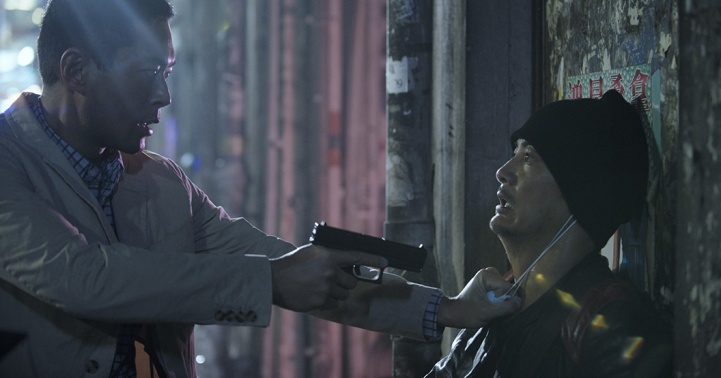
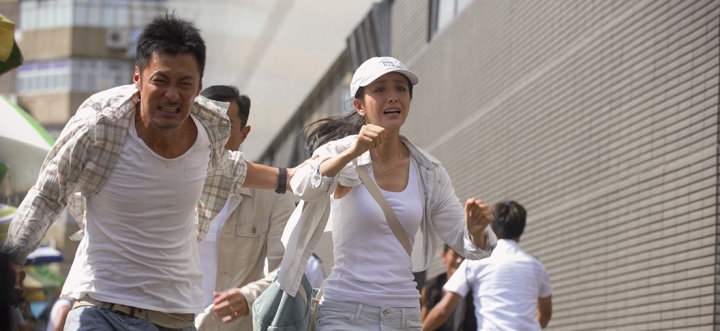





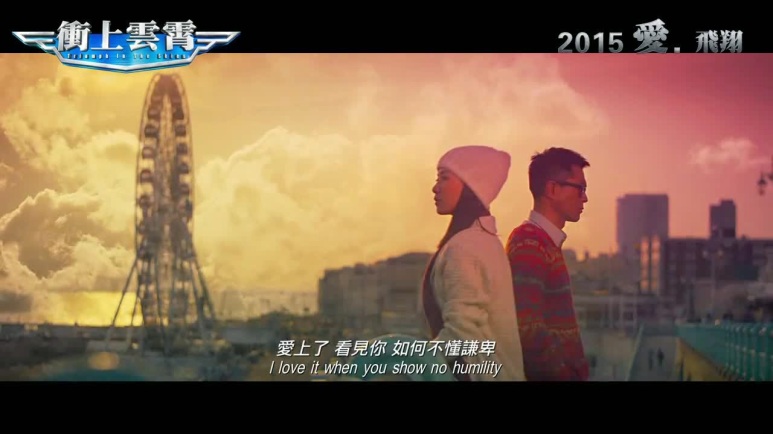




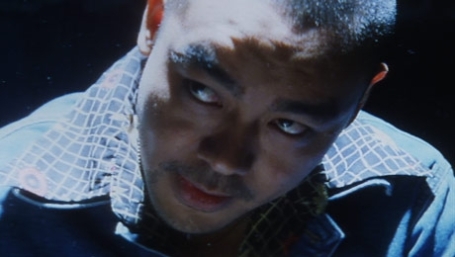


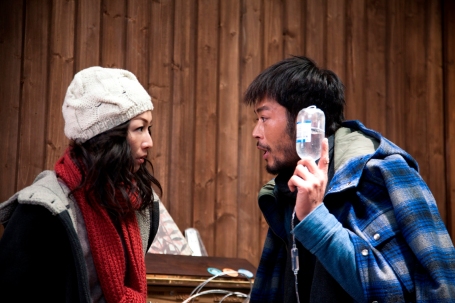


Recent Comments